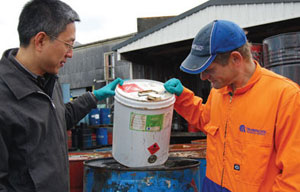Environmental Health Officer
Tasks & duties

Environmental health officers may do some or all of the following:
-
monitor and manage potential health risks to the population
-
investigate infectious diseases, such as salmonella, and advise people how to prevent their spread
-
investigate health nuisances
-
monitor food safety in food premises
-
advise on the health requirements on building consents
-
take samples from sites to test for environmental pollution
-
take legal action against serious breaches of environment-related laws and regulations
-
teach people about public health
-
work with the media to educate the population about public health matters
-
work on policy development at regional and local levels
-
research environmental problems affecting public health and report on them
-
report on resource consent applications
-
report on liquor licences and inspect licensed premises as required by regulation
-
report on Land Information Memorandum (LIM) applications
Specialisations
Health protection officer
Someone qualified as an environmental health officer could also be employed by a district health board as a health protection officer. Their focus is regional health and involves food safety, disease control, public health issues as well as researching, educating on, and developing policy.
The New Zealand Food Safety Authority and Ministry of Health also employ environmental health practitioners to provide policy advice to central government and to develop guidance for the food industry.
Other specialisations
There are other specialisation areas for environmental health officers:
-
Independent food safety auditing agencies employ environmental health practitioners who then receive auditing training for auditing food safety programmes.
-
There are specialist opportunities at environmental and noise monitoring consultancies, which measure and provide noise solutions.
-
Some councils have specialist positions to deal with issues related to noise levels.
-
Drinking water assessment roles are available with local councils and some private companies
Skills & knowledge

Environmental health officers need to have:
-
knowledge of environmental and health issues, and related regulations and standards
-
knowledge of Acts of Parliament that relate to public health, such as the Resource Management Act, the Food Act and the Health Act
-
knowledge of practical applications of microbiology
-
knowledge of food industry processes and technology
-
technical skills for taking water samples, and using noise and light-measuring equipment
-
research and analytical skills for infectious disease investigations and complex nuisance complaints
-
skill in analysing information
-
problem-solving skills
-
good written and oral communication skills
Entry requirements
To become an environmental health officer, you need to have a Bachelor of Applied Science (majoring in environmental health or health protection), or a Graduate Diploma in Environmental Health (in addition to a Bachelor's degree in a related area). These qualifications are available at the Auckland University of Technology (AUT) or Massey University.
After getting a job with a local authority or other government agency, you will receive the appropriate designation or warrant.
Entry requirements for specialist environmental health officer roles include:
-
Food Act officer – risk assessment papers (done as part of the normal Bachelor's course mentioned above), or short courses that the New Zealand Food Safety Authority (NZFSA) provides.
-
Quality controller (food manufacturing) – food technology paper (done as part of the normal Bachelor's course mentioned above) or a Bachelor of Science in Food Technology.
-
Work at district health boards or policy work in an organisation involved in public health work – Postgraduate Diploma in Public Health.
Secondary education
A tertiary entrance qualification is required to enter further training. Useful subjects include English, maths, chemistry, biology and science.
Training on the job
Many skills are gained on the job, and environmental health officers are expected to attend specialised courses in areas such as food quality assurance and noise control.
Environmental health officers need to keep up to date with new legislation, the introduction of new foods and new technological systems. For example, the growth in the olive-growing industry means the noise made by bird-scaring devices on olive orchards must now be monitored. This has raised issues concerning olive oil extraction and bottling processes.
Other requirements
You need a current driver's licence to get a job as an environmental health officer.
Useful experience
Useful experience for environmental health officers includes:
-
work in the health, food or hospitality industries
-
experience in laboratory or science work
Video
From careersnz on you tube
For more information, please refer to Career Services.
Document Actions
